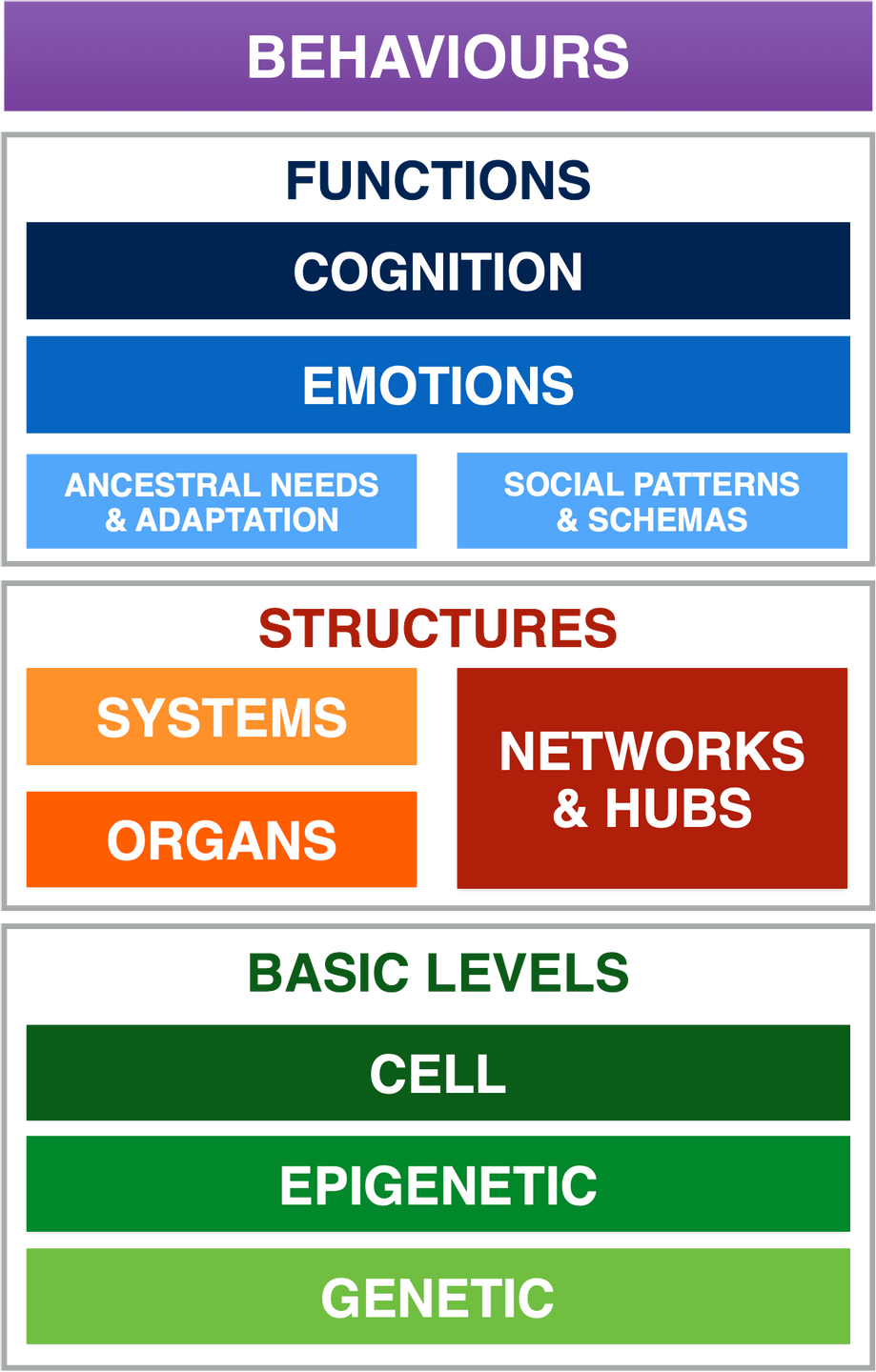“Modern sciences identify specific mechanisms and processes – for both physical and mental health – that can make the difference in the effectiveness of a therapy, in the success of a counselling session or in an educational process.
Our goal is to identify these mechanisms and find strategies and techniques that can be implemented by professionals in their daily practice.”
What are Integrative Sciences?
The principal goal of Integrative Sciences is to facilitate the translation of different disciplines and researches into operational tools for health and change professionals.
What we daily encounter and how we respond changes our minds and emotions, as well as our nervous, immune and endocrine systems. It even turns on or off genes (epigenetic expression), resulting in mental and physical health or, vice versa, dysfunctions or pathologies. We, as change and health professionals, need to understand all these systems, how they influence each other and how to bring them back to physiology.
Years of research and fieldwork have enabled us to shape the Integrative Sciences which represents the theoretical and scientific foundation to our method and includes an ample spectrum of techniques, models and strategies.
In addition to schools of thought more traditionally devoted to mental and emotional aspects, we also integrate:
- Interpersonal and Behavioural neurosciences;
- Psychoneuroendocrinoimmunology, which is very helpful in providing a scientific understanding of the processes at the heart of somatisation and of the reciprocal mind-body inter-relation in general;
- functional biomechanics, which understands and manages movement involved in stress-related posture, fight-or-flight behaviours, and any adaptation process;
- Ethological and modern Evolutionary Theories and studies that are the result of integration themselves, such as Behavioural Immunology;
- Neuroscience of Storytelling;
- Artificial Intelligence, Game Theory, Complex Systems Theory;
- Mental and Emotional Metabolism;
- and much more.
Mapping (and Easily Managing) the Complexity
There are various different elements that require analysis and intervention. To help navigate these different levels we have developed and refined two models. These models can be seen as a middle ground between a map and a checklist as they help both the professionals and the patient move in between different levels of analysis while maintaining a clear view of where everything is and what can be analysed more in depth. It is thus possible to keep an eye on all the elements at play and to switch between different synergistically inter-related modes in order to reach the desired objectives.
To the right you'll find the Functional Integrative Patterns map. This map is useful to help keep an encompassing and process-focused view focusing on the sequence of events that lead to a specific type of behaviour, emotional experience, decision or other life experience.
The graphic below is the Switch map. Switches provide a way of working on all the systems involved: epigenetics, neural plasticity, mental-postural-motor flows, brain networks, circadian rhythms, inflammation, the brain-bowel axis and much more.

Change & Empower the Way You Look at Your Clients and Their Problems
When we look at the way that a person ‘works’ – their reactions, their modes of being, their more or less effective ways of adapting to reach their objectives – we are actually only observing the end result of a complex system of processes and phenomena taking place inside them.
Various processes are taking place: some sequentially, others simultaneously. Some steps affect those that come directly after, and often there is a system of retro-feedback which allows the re-evaluation of what is happening so as to respond more flexibly to a change in the environment, in other people, or even in the resolution of the initial situation.
Understanding the hierarchies and the ways that these systems and processes influence each other is very useful to help design a therapeutic or educational strategy that respects and follows these patterns.
Click below to discover more about how to tackle psychosomatics and resistance to change with an integrative approach.
Read more...
The Three Pillars of our Work
Theoretical Basis
◆ PNEI
◆ Neuroscience
◆ Evolutionary Anthropology
◆ Compared Ethology
◆ Interpersonal Neurobiology
◆ Nutrition and Food Science
◆ Artificial Intelligence, Game Theory, Complex Systems Theory
◆ Mental and Emotional Metabolism
◆ And many more amazing sciences!
Application Areas
▶ Psychology and Psychotherapy
▶ Medicine
▶ Counseling
▶ Coaching
▶ Physiotherapy
▶ Osteopathy
▶ Complementary medicine
▶ Disciplines of health and wellbeing
Methods and Tools
❖ Change Switches
❖ Integrative Functional Patterns
❖ Psychosomatic and Resistance to change Triggers and Patterns
❖ Isometric Emotions and Interpersonal Accommodation
❖ Ancestral Needs
❖ The Flows (ideative, communicative, motor, postural, relations, etc.)
❖ And many more - discover all of them in the blog and in the courses!
Fabio Sinibaldi, MBPsS, PsyD
Author | Research & Development Professional | Integrative Psychotherapist | Keynote Speaker
President of the Association for Integrative Sciences
CEO & Founder of Real Way of Life
Member of the British Psychological Society – Psychobiology Section
Regional manager SIPNEI- Lombardy (PsychoNeuroEndocrineImmunology Italian Society)
SAN Member– Society for Applied Neuroscience
Fabio is an expert in Applied Neurosciences and PsychoNeuroEndocrineImmunology which he combines with an evolutionary and ethological standpoint.
With an international career spanning more than 20 years, he is the founder of the Association for Integrative Sciences and of the Real Way of Life research and training institutes.
Working as a clinician, researcher and trainer, he is the developer of the Integrative Sciences, the Switch Model, the Integrative Functional Patterns, Isometric Emotions techniques, Ideographic Thinking, and several other integrative techniques (developed to manage psychosomatic diseases, chronic stress, trauma, self-regulation, emotions, development processes, etc. in a targeted way).
His work incorporates: neuroplasticity, brain and mental metabolism, brain networks, nutritional neuroscience, primal social intelligence, mental-postural-emotional-motor flows, and more.
He conducts seminars on The Switch Model throughout the world.
Lecturer at post graduate schools of psychotherapy and counselling, he holds seminars for universities and institutions in different countries.
Fabio regularly attends national and international congresses as a speaker, as well as an author of many successful books and articles published in different languages.


Sara Achilli, B.Sc. Nutrition
Author | Research & Development Professional | Nutritional Consultant | Keynote Speaker
Vice President of the Association for Integrative Sciences
CEO & Founder of Real Way of Life
Member of the Regional Steering Committee of Lombardy SIPNEI (Italy)
Member of: SIPNEI (Italy) The Nutrition Society (UK); Parenting UK (UK)
Sara has a Degree in Nutrition Sciences and is a Nutrition and Health expert that focuses on the ways that food, nutrition and physical activity affect our health, emotional responses, mood and cognitive abilities. She is co-founder of the Association for Integrative Sciences and of the Real Way of Life research and training centres where she works as a consultant, researcher and trainer.
She developed the Emotional-Metabolic Switch model to intervene on inflammatory conditions of the gut, brain and, at the same time, on energy metabolism and the efficiency of mind-body interaction.
Her work slots into the Change Switches theory starting from initial cell responses (metabolic energy, epigenetic marking, inflammatory cascade) and is applied right throughout, across various levels of complexity that influence initial adaptation responses (from hunger to a sense of void), to brain networks at the heart of emotions and self-image (both physical and relating to identity), to self-regulation and primary interpersonal relation models (tolerance towards waiting, nurture, sharing etc.).
Sara researches and evaluates the reciprocal influence between nutrition, cell responses, epigenetics, responses to pain, management of emotions and behaviour.
Sara coordinates nutrition and wellbeing projects both at individual clinical level and in their overall social implication aspects, presenting her findings each year to an international audience.
Author of many successful books and articles published in different languages.
Let's Stay Connected
We like to share our latest research results and information.
Sign up to have them sent directly to your mailbox!
THE SWITCH – The Science of Change
The complete guide for driving effective change
Here are two videos in which we virtually browse the book together, so you can take a look inside and decide to buy it freely.
Take a Look at the Table of ContentsEverything that needs to
change to favour change
Every mental and physical health professional is faced daily with having to correctly identify complex processes and to decide what is the most effective intervention possible.
In order to completely understand all the different processes involved in human behaviour and health, ranging from reactions to stress to personal motivation, from emotions to psychosomatics, it is necessary to consider various aspects at different levels. These may be adaptation processes, innate responses, epigenetics, acquired schemas, nutrition, metabolic elements, neural plasticity and many others.
Our book “The Switch – The Science of Change” is specifically developed to provide practical tools to help in this endeavour. The word “switch” in the title recalls metaphorical switches that are not, however, magical buttons but correspond with the various elements on which it is important to intervene strategically, setting the ideal conditions for change in complex phenomena such as mental attitudes, ways of reacting to stress, interpersonal relationship styles and behaviour.
This book gathers all the most relevant and well-documented recent discoveries and presents them as part of an integrated system that starts at microscopic level and encompasses more complex behavioural and decision-making flows. The book is packed with suggestions, practical application tips and tools to intervene in a targeted way on all the elements at play.
Available both in paperback and ebook format.
You can find it on Amazon.com or on your country’s Amazon website (amazon.co.uk, amazon.com.au, amazon.es, amazon.de, etc.) simply by searching for “The Switch The Science of Change Sinibaldi”.
Buy on Amazon.com!
